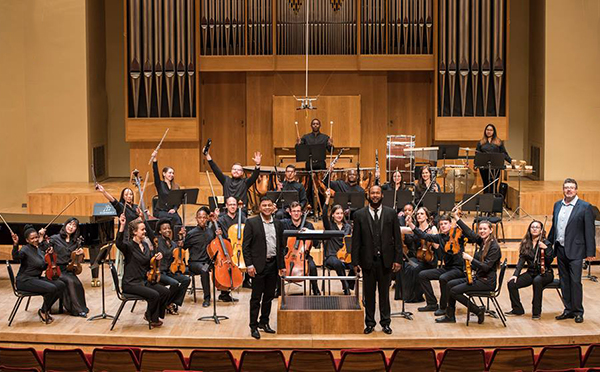
The final concert at Endler Hall at Stellenbosch University, presented by the
Endler Concert Series, was attended by the UFS Rector and Vice-Chancellor,
Prof Francis Petersen and Mrs Cheslyn Petersen. Here, on stage, is Prof Petersen
with the Camerata.
Photo: Supplied
The OSM Camerata (OSMC) of the Odeion School of Music at the University of the Free State ended the 2017 concert season on a high note with two gala concerts presented in the Western Cape as part of the ensemble’s fifth birthday celebrations. The first concert took place at the well-known Hugo Lambrechts Auditorium in Parow on 20 October 2017. A Stellenbosch University audience also had the privilege of listening to the Camerata at Endler Hall the following day.
A substantial part of the concert programme recited during the concerts was dedicated to prolific South African composer, Prof Hendrik Hofmeyr, in honour of his 60th birthday on 20 November 2017. The ensemble recited Super Flumina Babylonis, Notturno Elegiaco & Spokewals/Phantom Waltz - all works commissioned from Prof Hofmeyr for the OSMC.
The Odeion School of Music awarded the Order of the OSM to Prof Hofmeyr during the concert in gratitude for his tremendous contribution as a South African composer.
The final concert at Endler Hall, presented by the Endler Concert Series, was attended by the UFS Rector and Vice-Chancellor, Prof Francis Petersen, and Mrs Cheslyn Petersen.
According to Marius Coetzee from the Odeion School of Music, the OSMC was strategically founded in 2012 as the OSM’s flagship chamber orchestra with its main objective being to create a catalyst for excellence. From a pedagogical perspective, the OSMC serves as an incubator to nurture fully rounded musicians who are thoroughly prepared for the demands of their trade as orchestral musicians, soloists and conductors.
Responding to the demand for excellence, on 1 September 2017 it was announced that the OSMC received first prize for the 2017 Ictus International Music Competition (US) as the winner of the category for Conservatory and University Orchestras.
Louis van der Watt, head of strings at the University of Stellenbosch Conservatory and vice conductor of the university’s symphony orchestra, remarked that the OSMC presented an excellent concert. Audience members concurred, saying the OSM Camerata was setting new standards for orchestral playing in South Africa.
Review from Louis van der Watt, University of Stellenbosch (available in Afrikaans)